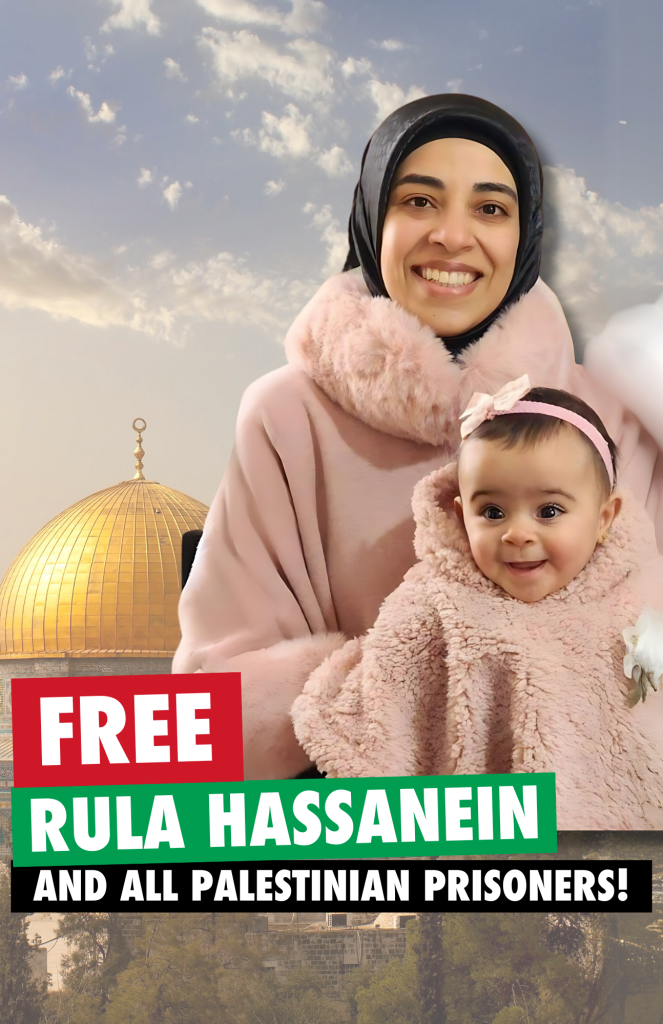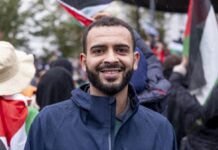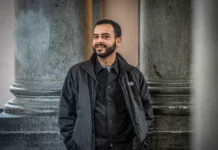
The following article, by author Alaa Abed, was originally published in Arabic at Banafsaj, a Palestinian website dedicated to women’s issues, on 20 November. Read the original Arabic here: https://bnfsj.net/p/2310 For more information about Palestinian women prisoners or to get involved with the independent international campaign for their liberation, please visit Dismantle Damon at https://instagram.com/dismantle_damon or https://t.me/dismantle_damon. Rula Hassanein, abducted by the Zionist occupation forces on 19 March 2024 from her home in al-Ma’asara, southeast of Bethlehem, is one of multiple women journalists imprisoned by the occupation, including Rasha Herzallah, Israa Lafi, Bushra al-Tawil, Amal Shujaiya, Nidaa al-Zoughaibi, and Sumaya Jawabreh (in house arrest). Freedom for Rula and all Palestinian prisoners! The translated article follows:
Accused of incitement and compromising state security, journalist Rula Hassanein faces trial alongside many others in Damon Prison under conditions that can only be described as inhumane. The cells are cold in winter, hot in summer, and are reported to have been a stable for horses or a tobacco warehouse in the past. At Damon, the occupiers intensify their oppression of women by confiscating clothes and blankets so that each prisoner has only one outfit, limiting showers and outdoor time, and cramming prisoners into overcrowded cells without enough beds. The list of violations is long.
In this interview, we speak with Hadeel Hassanein, the elder sister of journalist Rula Hassanein, to discuss Rula’s life as a mother and journalist, her over ten years of experience in journalism, and about her life, torn apart by the occupation. The walls of Damon Prison have separated a mother from her infant daughter, only months old at the time of her arrest, details that we really must record and preserve as they are an integral part of the ongoing Palestinian story and their ongoing Nakba, for over 76 years.
Rula Hassanein: The Mother and Journalist
The imprisoned journalist Rula Ibrahim Hassanein, who turned 30 in Damon Prison, hails from Al-Jalazone Refugee Camp, north of Ramallah, and holds a bachelor’s degree in Journalism and Media as well as a master’s in Contemporary Arab Studies, both from Birzeit University. She has worked in journalism for over a decade and is an active member of the Palestinian Journalists Syndicate. She is married and a mother to a baby girl who was nine months old at the time of her arrest.
On a personal level, I have a close friendship, work and student relationship with the journalist Rula. Having lost her father at a young age, she is known for her sound judgment and strong stances. There was no room for grey areas in her life, as the truth is always more deserving of being followed, as she always said. I can describe her as a genuine friend, the kind of friend who is always present, loyal to her friends, pure in her affection, generous in her giving. She never tires in her conversations of going beyond personal concerns to the duties of citizenship, efforts at social reform, and the needs of a Palestinian society that seeks liberation from its occupier, longing for freedom.
Rula was thrilled to be pregnant with her first two children, Youssef and Elia. Despite suffering from chronic kidney disease, and doctors warned that her health condition would worsen with pregnancy and childbirth, which made her pregnancies particularly challenging,as she endured the pain and the risks to bring her children into the world. When her condition posed a threat to her life and the lives of her children, doctors opted for early delivery in her eighth month of pregnancy.
Baby Youssef died three hours after his birth, while Elia spent over 40 days in the neonatal intensive care unit. Elia left the hospital with health issues that required ongoing treatment, including respiratory problems due to her premature birth. Meanwhile, Rola experienced postpartum depression due to her grief over her baby Youssef, and additional health complications.
The Night of the Arrest
Two days before Mother’s Day, Israeli forces arrested journalist Rula Hassanein, depriving her of celebrating her first Mother’s Day with her daughter Ilya. Her sister Hadeel recounts:
“On March 19, 2024, the arrest order was brutally executed. The house was raided at night, she was handcuffed and blindfolded. The weather on the night of the arrest was very rainy and very cold, which only worsened the situation. Despite Rula informing the soldiers that she was a mother to an infant and needed medication for chronic illnesses, they refused her requests to bring her medicine. She asked them to take her little girl with her, who was entirely dependent on breastfeeding and refused to accept formula, but they refused as well.”
Hadeel added, “My sister suffers from chronic kidney disease, diagnosed in 2017, and her condition worsened during pregnancy. At the time of her arrest, she also suffered from postpartum depression, kidney complications from pregnancy, gastrointestinal infections, irritable bowel syndrome, severe migraines, and leg pain, none of which was taken into account as they arrested her brutally.”
False Charges of Incitement
Four days after her arrest, Rula appeared in court where she was charged with incitement on social media. Hadeel explains:
“We learned that the charge against her was ‘incitement’ on social media, due to her journalistic work. In fact, before her arrest, she was threatened more than once and her photos were circulated in Telegram groups run by settlers, such as the ‘Nazi Hunters’ group. They directed their incitement against her personally, calling her a top instigator against the occupying state, and that she is one of the journalists who incite against Jews and Zionists.”
The indictment included posts that the occupation claimed Rula had published on her social media accounts, translated into Hebrew, and they showed the number of likes on each post, and the number of followers, which was greater than 3,400.
Despite two Israeli military court rulings for her release (April 17, 2024, and July 2, 2024), the prosecution appealed each time, keeping her in custody under the pretext of “state security”. Israeli military law supposedly prohibits the detention of mothers with children under two years old, yet this was ignored in Rola’s case. This is what happened when the occupation tried to arrest the writer Lama Khater from al-Khalil, and the implementation of her arrest was postponed due to the presence of her son Yahya.
Hadeel said: “After the release decisions were issued, the prosecution resorted to an appeal, so she was not released, because the charges against her are ‘incitement that harms state security’, and therefore she must be detained to preserve the security of the occupying state, and the state of emergency created on 7 October prevents the implementation of any rules regarding the arrest of mothers.”
The Struggle of Mother and Daughter
Both the imprisoned mother and her daughter suffer deeply, living in a complex state of loss and a constant feeling of anxiety. Rola has had no contact with her child for over seven months, relying only on updates from her lawyer, while her family lives with worry for their daughter, especially in light of the dangerous conditions that both male and female detainees are currently experiencing.
Meanwhile, her daughter Elia, cared for by her father, Dr. Shadi Breijieh, and paternal grandmother, has suffered greatly due to the absence of her mother. At the beginning of Rula’s detention, Elia would not take any type of baby formula, so she faced malnutrition and hospitalization on multiple occasions during the initial period of her mother’s absence. She eventually required intravenous feeding and suffered other health problems, such as breathing issues and insufficient oxygen.
Hadeel shares:
“Since Rula’s arrest, her father Shadi has been taking care of her with her grandmother. He is trying to compensate for the loss of her mother, and he is making sure that the little girl does not forget her mother. Rula’s pictures are spread everywhere in the house, so that the little girl gets used to her mother’s image and appearance, so she does not feel strange when Rula leaves prison. The truth is that Elia often carries a picture of her mother and walks around the house calling out, ‘Mama, Mama.'”
Discover more from Samidoun: Palestinian Prisoner Solidarity Network
Subscribe to get the latest posts sent to your email.




